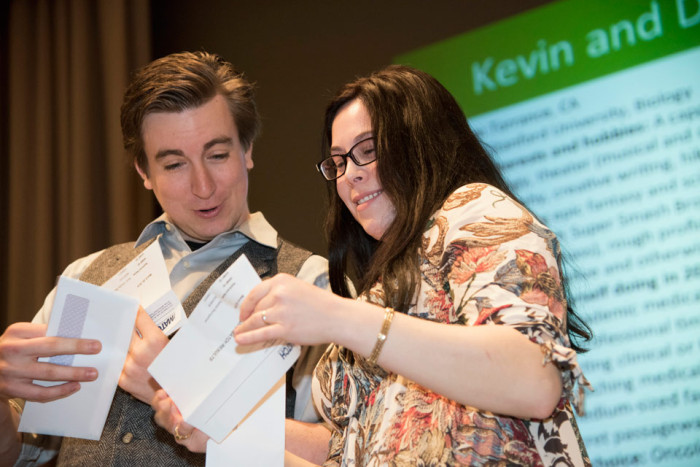Kevin Baumgartner
Roadblocks to health care inspired medical student Kevin Baumgartner to advocate for the vulnerable

Kevin Baumgartner and his wife and fellow medical student, Desiree Baumgartner, learned on Match Day in March that they will do their residency training at Barnes-Jewish Hospital, Kevin in emergency medicine and Desiree in psychiatry. <em>Photo: Robert Boston</em>
The Saturday Neighborhood Health Clinic gave Kevin Baumgartner a front-and-center, often heartbreaking view of inequities in health care.
The clinic, in the Forest Park Southeast neighborhood, operates on a first-come, first-served basis and is run by students at Washington University School of Medicine, with help from a volunteer, board-certified physician. Baumgartner, who soon will receive his medical degree, was co-manager of the clinic his sophomore year.
“Working at the clinic gave me an intimate view of the pressing social challenges we’re facing in health care,” he said. “I helped take care of hard-working people who through no fault of their own have no jobs, insurance or transportation. I saw firsthand how our current health-care system fails our neediest citizens. This experience helped motivate me to dedicate my career as a physician to improving safety-net health care and advocating for the vulnerable.”
Among the most important lessons he learned, Baumgartner said, is that routine, life-saving care is beyond the reach of many. That fact helped him decide to pursue emergency medicine and do what he can to affect change beyond the emergency department, too.
Baumgartner recently learned he will do his residency training in emergency medicine at Barnes-Jewish Hospital — his first choice. He loves the program here, welcomes the challenges that come with the range of patients and ailments seen at BJH, and he and his wife, who also is graduating with a medical degree, love St. Louis. His wife, Desiree Baumgartner, also will train at BJH, in psychiatry.
Kevin Baumgartner wants to collaborate with primary care physicians, hospitals, and community leaders to improve health-care access for the neediest patients. “Specifically,” he said, “I’d like to see an increased role for our emergency departments in helping underserved patients get access to follow-up care and social resources.”
He also plans to promote evidence-based practices in medicine. “I’ve had the privilege to work with physician-scientists who are spearheading efforts to produce rigorous, clinically applicable research, as well as physician leaders who are making the daily effort to promote evidence-based practices,” he explained. “They’ve inspired me to make evidence-based medicine the core of my practice and to work on incorporating the best practices into our clinical, educational and administrative systems.”

In the future, Baumgartner wants to practice academic emergency medicine at a busy Level 1 trauma center such as BJH. He’d also like to get involved, on the national level, in quality-improvement research, resident and medical student education, public advocacy and undergraduate medical education reform.
“I’ve been very fortunate to have been taught by fantastic physicians about health inequalities, health-care access, and the nuts and bolts of working to improve public health,” Baumgartner said. “I would like to do what I can to make our health care better, and perhaps to teach others the important lessons I’ve been taught.”






